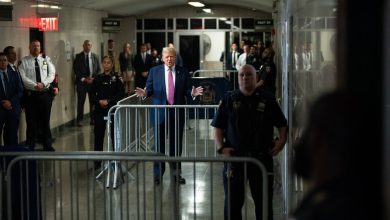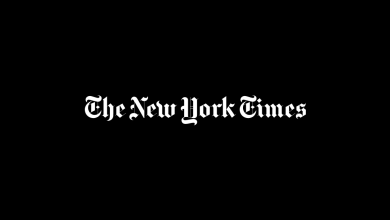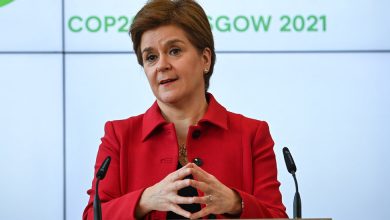Biden’s TikTok Problem


It’s hard to keep track of so many bytes.Credit…Florence Lo/Reuters
Did Biden drop the ball on TikTok and China?
An explosive report from BuzzFeed raises more questions about whether TikTok, the Chinese-owned video app, exposes the personal information of Americans to Beijing. It also puts President Biden’s China policy under a new spotlight as China’s economic power continues to grow — and the Biden administration continues to take a decidedly softer approach than its predecessor. (The New York Times has not independently verified BuzzFeed’s reporting.)
Here’s a quick TikTok recap. During Donald Trump’s presidency, the Committee on Foreign Investment in the U.S., which reviews outside investments with national security in mind, opened an investigation into TikTok. Trump used its results to issue an executive order forcing ByteDance, TikTok’s Chinese parent, to divest the company. That is what led TikTok to strike a deal to sell to Oracle and Walmart. But when Biden took office, he did not enforce the divestment order — and ByteDance didn’t sell. Concerns about China’s access to personal information stored by TikTok, though, remained. Earlier this year, TikTok was working on a deal to store its data on Oracle servers to please regulators, and the BuzzFeed article says such a deal is still in the works.
Chinese engineers had access to data on Americans as recently as this year, BuzzFeed reports. “Everything is seen in China,” a member of TikTok’s trust and safety department reportedly said in a meeting last September, and U.S. employees had to ask their Chinese colleagues to explain how data from U.S. users was flowing. The article also cites concerns by experts that, whatever measures ByteDance puts in place, China could still force it to hand over data. It hasn’t hesitated to push tech companies around in recent years.
The deal with Oracle is supposed to be the solution. Shortly before BuzzFeed published its article, TikTok announced that it was moving all the data from its American users through servers controlled by Oracle. But it also said it would still store its own backups of that information. And TikTok itself has acknowledged the risk that employees in China might get access to data stored in the U.S. TikTok said in a blog post on Friday that it was “working closely with Oracle to develop data management protocols that Oracle will audit and manage to give users even more peace of mind.” It also outlined other operational changes, including a new department to solely manage U.S. data.
The article raises questions about Biden’s approach to TikTok and Chinese deal-making. “Not following through with a TikTok ban was a huge mistake” on the part of the U.S., said Palmer Luckey, the founder of Oculus. More broadly, U.S. regulatory scrutiny seems to have helped minimize further Chinese investment in the country, but despite warnings that regulators might look again at a score of past investments, they have taken little apparent action. And while Congress is threatening to crack down on U.S. companies’ investments in China, it is far from certain a bill will pass. For Biden, the timing of the BuzzFeed story is awkward, given that he is also weighing a rollback of another remnant of Trump’s tough-on-China era: tariffs on Chinese goods. With midterm elections ahead, will he risk rattling the youth vote by taking another look at TikTok?
HERE’S WHAT’S HAPPENING
Thousands of flights are canceled or delayed. Over the holiday weekend, which included the busiest travel day of the year, staffing shortages caused widespread flight disruptions. And a pilot shortage has prompted American Airlines to stop flying to Toledo, Ohio, and Ithaca and Islip, N.Y., in September.
President Biden says he may move to pause the federal tax on gasoline. The move would provide some relief for Americans struggling with gas prices, which are hovering at around $5 a gallon. The White House is grappling with how to address record inflation.
Ernst & Young’s breakup plan would bring multimillion-dollar payouts for partners. The proposal to split its auditing and consulting businesses, which relies on optimistic growth forecasts, could be implemented late this year and would mean that the consulting business would go public, The Wall Street Journal reported.
European countries lean more on coal. Out of concerns about Russia choking its gas supply, Germany’s economy ministry said it would increase its dependency on coal-fired power plants and store more gas. The Dutch government declared an “early warning” stage of a natural gas crisis because of Russia’s tightening of supplies.
Elon Musk says there are still some “unresolved matters” for the Twitter deal. In an interview with Bloomberg, he also reiterated that he was waiting to hear how many fake or automated accounts were on the platform. When asked whether he would support Trump in a 2024 presidential election, Musk said: “I’m undecided at this point.”
A stock-market bet for Bitcoin skeptics
As crypto holders watch the market tank, skeptics can begin betting against Bitcoin on the New York Stock Exchange today. The S.E.C. greenlit a new exchange-traded fund late last week from the investment manager ProShares that rises in value when the price of Bitcoin plummets, as it has recently. Over the weekend, Bitcoin’s price fell below $20,000 for the first time since 2020, and it even slipped below $18,000 at one point before climbing back above $21,000 today.
The new fund, the ProShares Short Bitcoin Strategy E.T.F., does not directly buy or sell Bitcoin. Instead, it places wagers on futures contracts on the Chicago Mercantile Exchange that pay off when the price of Bitcoin dips. The firm also launched the first Bitcoin futures E.T.F. last fall, which bets that prices will rise, and amid the market struggles, ProShares’ C.E.O., Michael Sapir, says the timing feels right for this more pessimistic venture. “There probably is no better environment for it,” Sapir told DealBook.
The fund is launching when the price of Bitcoin has plunged. It is down 70 percent from its high in November. And the total value of all cryptocurrencies has fallen to about $1 trillion, from about $3 trillion in November. Much of the recent selling has been driven by collapses in so-called stablecoins — cryptocurrencies that were supposed to maintain a set value. But if those collapses don’t lead to wider problems in the crypto market, Bitcoin’s price could rebound.
Some are still waiting for an E.T.F. that holds actual cryptocurrencies. Bitcoin enthusiasts have long wanted to offer a fund that buys and holds the crypto itself, with no success so far. The S.E.C. chairman, Gary Gensler, contends that the barely regulated, always-on global Bitcoin market is too wild and unreliable, distinguishing it from futures funds based on the Chicago exchange, which is highly regulated and serves registered professional traders. Notably, Grayscale Bitcoin Trust — a crypto fund for accredited investors, currently trading at a deep discount — ran an ad and letter campaign to bolster its application to convert to an E.T.F. this year, and Grayscale has threatened litigation if it is denied. A decision is expected by early July. But with crypto markets now showing all the vulnerabilities regulators most feared, a former top S.E.C. official tells DealBook those crypto fund dreams probably won’t come true any time soon.
“I no longer live with or wish to be related to my biological father in any way, shape or form.”
— Elon Musk’s transgender daughter, in a petition to change her name to align with her gender identity that she filed in April.
Selling cars the Tesla way
In 2019, Tesla took heat for its decision to sell cars only online. Auto industry experts argued that whatever bad feelings people had about dealerships, they were essential to the business.
The online strategy, championed by Tesla’s chief Elon Musk, appears to be proving the naysayers wrong. Combining direct sales with a limited number of stores and service centers, Tesla dominates the fast-growing electric car market, even as other manufacturers struggle to sell cars because of a shortage of computer chips, The Times’s Paul Stenquist writes.
The approach could have major ramifications for the auto industry. Most carmakers and auto dealers are doing well right now because scarcity has pushed up prices for both new and used cars. But they may have to eventually adopt some of the changes Tesla has introduced.
Why the industry may need to change its ways:
-
Online car shopping is popular — and not just with people buying electric cars, said Michelle Krebs, an executive analyst for Cox Automotive. “Our data shows consumers want to do more of the process online, but most don’t want to eliminate the dealer visit altogether,” Krebs said.
-
It also cuts down on costs. Ford’s distribution and advertising costs per car are about $2,000 higher than Tesla’s, the C.E.O. of Ford Motor, Jim Farley, said at an investor conference this month. Farley said Ford wanted to sell electric cars only online at nonnegotiable prices, without keeping lots of them at dealerships.
But there are hurdles to shifting sales online:
-
State laws can make it hard or impossible for automakers to deal directly with customers and often require established automakers to sell through franchised dealers. Some states, like Texas, offer rebates for buying electric vehicles, but only to those who buy from franchised dealerships.
-
Some Tesla owners complain that repairing or fixing problems with their cars can be an ordeal. It has far fewer service centers in the U.S. than more established automakers. And while Tesla technicians make home visits for minor repairs, only the service centers can handle some larger problems.
THE SPEED READ
Deals
-
Kellogg said it would split into three public companies by spinning off its North American cereal and plant-based businesses. (Reuters)
-
JetBlue raised its offer for the budget airline Spirit, as it dukes it out with Frontier. (WSJ)
-
The food giant Mondelez is buying Clif Bar for $3 billion. (CNN)
-
“Why a $33 Billion SPAC Deal Couldn’t Pay Its Bankers” (Bloomberg Opinion)
Policy
-
Medicare could have saved as much as $3.6 billion by buying certain drugs from a Mark Cuban-backed pharmacy, researchers found. (WSJ)
-
Semiconductor companies told Congress they will take their manufacturing elsewhere if the government does not increase funding for plants in the U.S. (NYT)
-
Goldman Sachs raised its projected likelihood of a recession to 30 percent from 15 percent. (Reuters)
-
A nationwide train strike in England brought it to a standstill, exposing economic unease. (NYT)
-
“How Elites Misread Public Opinion” (Politico)
Best of the rest
-
Disney’s C.E.O., Bob Chapek, is struggling to contain the fallout from the company’s response to Florida’s “Don’t Say Gay” legislation. (FT)
-
China’s once hot, hot housing market has cooled. (NYT)
-
Jay-Z’s free Bitcoin lessons for residents of the Brooklyn housing project where he grew up are running into skepticism. (Guardian)
-
An anonymous bidder paid $19 million for a private lunch with Warren Buffett, four times the winning bid in a previous charity auction. (CNN)
We’d like your feedback! Please email thoughts and suggestions to [email protected].



